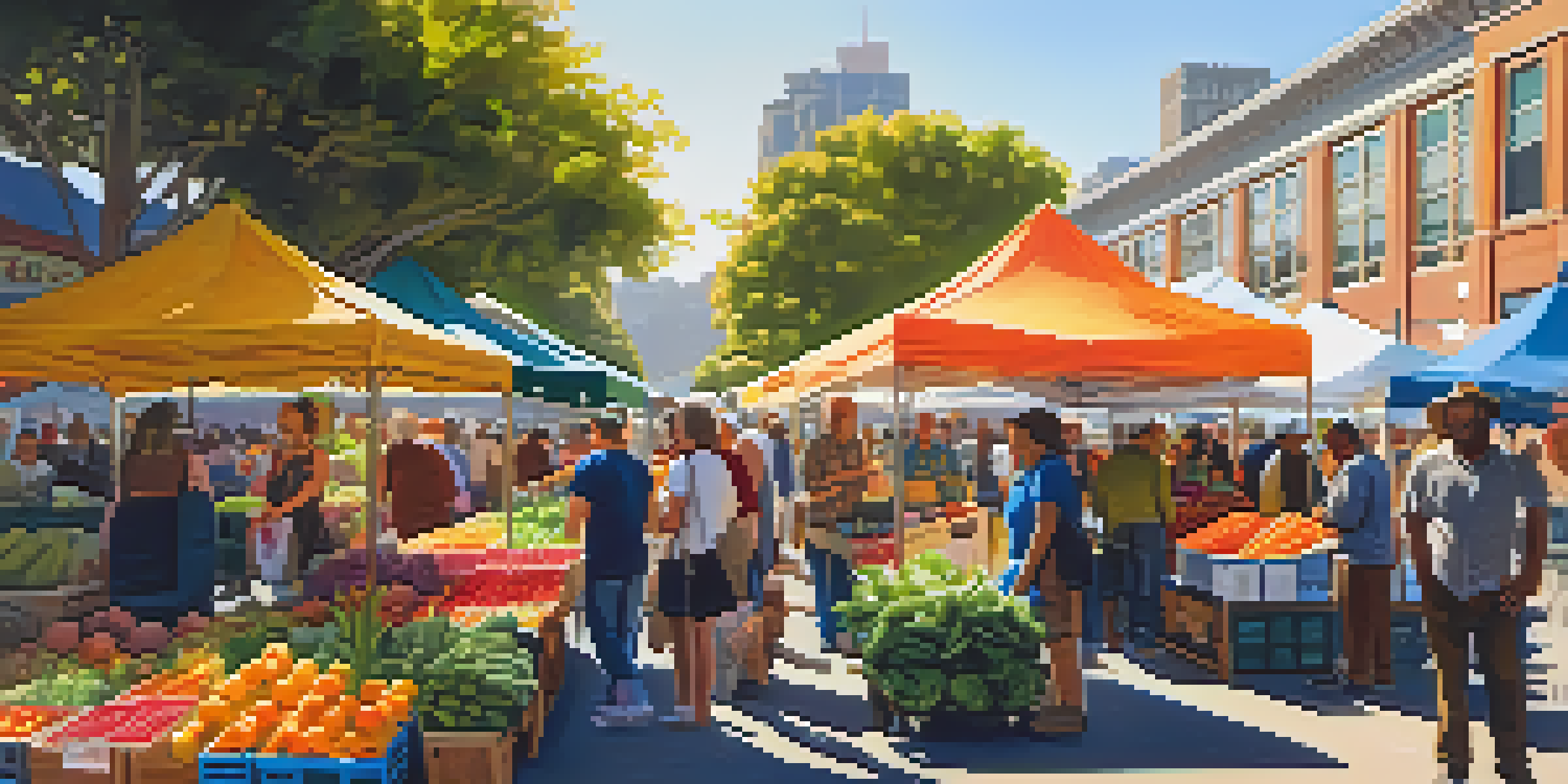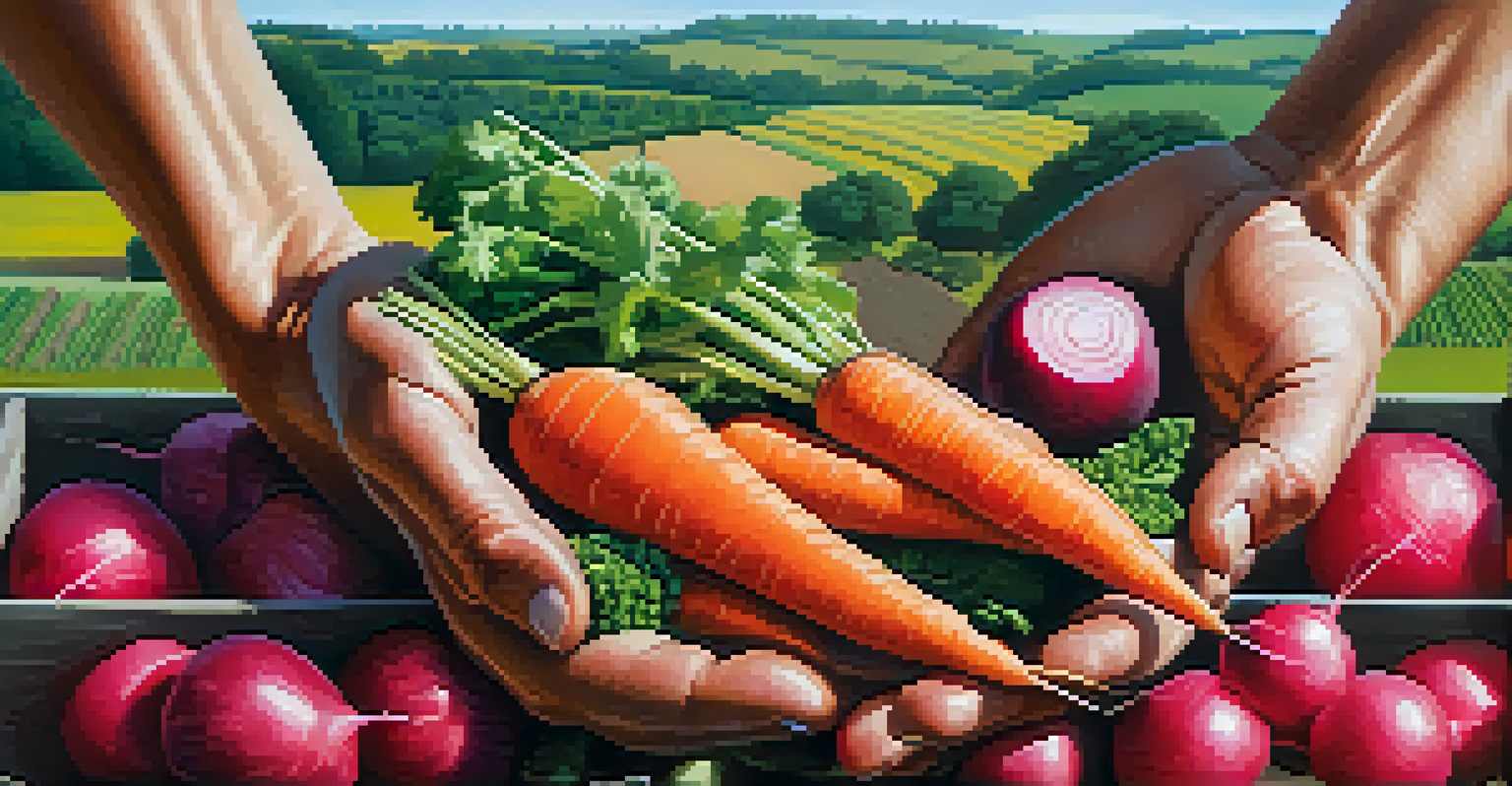How San Francisco Shaped the Modern Farm-to-Table Movement

The Roots of the Farm-to-Table Concept
The farm-to-table movement is all about connecting consumers with local food sources. It emphasizes the importance of fresh, seasonal ingredients sourced directly from farmers. San Francisco played a crucial role in this movement by fostering a community that values sustainability and quality over convenience.
Eating is an agricultural act.
In the 1970s, the city began to embrace organic farming and local produce, largely influenced by the health food movement. Farmers' markets started cropping up, making it easier for residents to access fresh ingredients right from the source. This shift not only supported local economies but also created a culture of awareness around food origins.
As chefs began to champion these local ingredients, they transformed menus across the city. The emphasis on freshness and seasonality allowed for a culinary renaissance, which laid the groundwork for what we now recognize as the modern farm-to-table philosophy.
The Influence of Iconic San Francisco Chefs
San Francisco is home to some of the most influential chefs who championed the farm-to-table movement. Chefs like Alice Waters at Chez Panisse were pioneers, focusing on local ingredients and sustainable practices long before it became mainstream. Waters’ approach to cooking revolutionized how restaurants viewed their sourcing methods.

Her philosophy inspired a generation of chefs in the city, encouraging them to establish relationships with local farmers. This not only ensured a fresh supply of ingredients but also fostered a sense of community between food producers and chefs. As a result, many restaurants began to reflect the local bounty in their dishes.
Farm-to-Table Connects Consumers Locally
The farm-to-table movement fosters a direct link between consumers and local food sources, emphasizing fresh, seasonal ingredients.
The ripple effect of these chefs’ commitment to local sourcing spread beyond San Francisco, influencing culinary practices nationwide. Their emphasis on quality ingredients and ethical sourcing continues to inspire restaurants around the country.
Farmers' Markets: A San Francisco Staple
Farmers' markets have become a staple of San Francisco's food culture, showcasing the city’s commitment to local agriculture. These markets not only provide residents with fresh produce but also create a space for conversation between farmers and consumers. It’s a chance for people to learn about where their food comes from directly from the source.
The future of food is local.
With vibrant stalls filled with colorful fruits, vegetables, and artisanal products, these markets highlight the abundance of local farms. Visitors can engage with farmers, ask questions, and discover new ingredients to incorporate into their meals. This connection fosters a deeper appreciation for food and its origins.
Moreover, farmers' markets serve as a platform for small-scale producers to thrive. They empower local farmers and artisans, ensuring that their unique products reach a wider audience, thus solidifying the community's commitment to supporting local economies.
The Role of Community Supported Agriculture (CSA)
Community Supported Agriculture (CSA) programs have flourished in San Francisco, bridging the gap between consumers and local farms. These programs allow individuals to subscribe to receive regular deliveries of fresh produce directly from farmers. This not only ensures a steady income for farmers but also guarantees fresh food for consumers.
CSAs have contributed significantly to the farm-to-table movement by encouraging people to eat seasonally. Subscribers often receive a variety of produce that reflects what is currently in season, pushing them to explore new recipes and ingredients. This fosters a deeper connection to the food they consume and the land it comes from.
San Francisco Chefs Lead the Way
Iconic chefs in San Francisco, like Alice Waters, have pioneered the use of local ingredients, inspiring a shift in culinary practices nationwide.
Additionally, CSAs promote a sense of community among subscribers, who often share tips and recipes or even participate in farm visits. This engagement cultivates a collective appreciation for local agriculture and the effort that goes into sustainable farming practices.
Sustainable Practices and Eco-Consciousness
San Francisco has long been a leader in promoting sustainable agricultural practices, which aligns closely with the farm-to-table movement. Many local farms prioritize organic methods, avoiding harmful pesticides and promoting biodiversity. This commitment to sustainability resonates with consumers who are increasingly conscious of their food choices.
The city also supports initiatives aimed at reducing food waste and promoting eco-friendly practices. Programs that educate residents about composting and responsible consumption have gained traction, further enhancing the sustainability ethos. This awareness encourages a holistic approach to food that goes beyond just the plate.
As consumers become more informed about the environmental impact of their food choices, they are more likely to seek out local, sustainable options. This shift has significantly shaped the farm-to-table movement, making it not just a trend but a lifestyle choice that values both health and the planet.
Impact on Local Businesses and Economy
The farm-to-table movement has had a profound impact on San Francisco's local economy, creating a thriving ecosystem of restaurants, farms, and markets. As demand for local ingredients increased, many small farms were able to flourish, providing fresh produce to restaurants and consumers alike. This symbiotic relationship has helped sustain the local agricultural landscape.
Restaurants that prioritize local sourcing often see increased patronage from conscientious consumers who value sustainability. This trend has encouraged more eateries to adopt similar practices, further embedding the farm-to-table philosophy into the city's culinary identity. As a result, diners can enjoy meals that are not only delicious but also support local farmers.
CSAs Strengthen Community Bonds
Community Supported Agriculture (CSA) programs enhance connections between consumers and local farms, promoting seasonal eating and community engagement.
Moreover, the economic benefits extend beyond just food. The emphasis on local sourcing has spurred job creation in farming, distribution, and hospitality. This interconnectedness strengthens the community and promotes a robust local economy that thrives on collaboration and shared values.
The Future of Farm-to-Table in San Francisco
As we look to the future, the farm-to-table movement in San Francisco continues to evolve. With growing awareness around food systems and sustainability, more people are advocating for transparency in sourcing. This trend reflects a broader cultural shift towards understanding the impact of food choices on health and the environment.
Technology is also playing a role in the future of farm-to-table dining. Delivery services and apps that connect consumers directly with local farms are becoming increasingly popular, making fresh produce more accessible than ever. This digital transformation is helping to sustain the movement by reaching a wider audience.

Ultimately, the spirit of the farm-to-table movement is deeply rooted in community and connection. As San Francisco continues to champion local food sourcing, it sets a powerful example for other cities to follow, ensuring that the conversation around sustainable practices remains vibrant and impactful.